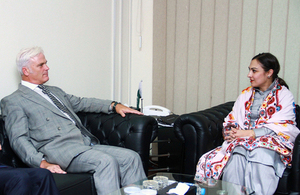UK’s minister reiterates DFID support to Pakistan’s national social safety net
DFID has supported BISP since its inception, committing £300 million to the programme from 2012 to 2020.

Desmond Swayne MP, Minister of State for International Development met Ms. Marvi Memon, Member of National Assembly of Pakistan.
During the visit to Pakistan of Desmond Swayne MP, the UK’s Department for International Development reiterated its support to the Benazir Income Support Programme (BISP), the Government of Pakistan’s national social safety net, which currently reaches up to five million of the country’s poorest women.
DFID has agreed a revised Memorandum of Understanding (MoU) with the BISP Secretariat and the Economic Affairs Division of the Ministry of Finance. The MoU covers three new agreements. It brings forward some of the core financing for the Programme and agrees to support the enrolment of 500,000 children of BISP beneficiary families in primary schools through a supplementary conditional cash transfer till 2017; agrees to support beneficiary communication and outreach; and agrees the use of DFID funds for updating the National Socio-Economic Registry (NSER) which helps verify that all BISP beneficiaries are amongst the poorest people in the country. The NSER will also help other provincial and federal programmes to identify and reach the poorest more effectively through other programmes.
DFID has supported BISP since its inception, committing £300 million to the programme from 2012 to 2020. DFID support is primarily to the national cash transfer programme providing women from the poorest households a monthly stipend of Rs 1,500. DFID is also supporting BISP’s education conditional cash transfer (Waseela-e-Taleem) to encourage the poorest families to send their girls and boys to school.
Desmond Swayne MP, Minister of State for International Development said that
DFID will continue to support the Government of Pakistan in expanding and strengthening the country’s largest national social safety net. This support is vital to empowering nearly 5 million women from some of Pakistan’s poorest families through monthly stipends. These stipends allow them to buy essential items such as food and medicine, and protect them from shocks such as illness or unemployment, which can push families deeper into debt and poverty.
Alongside the main unconditional cash transfers, BISP’s use of supplementary conditional cash transfers is an impressive example of how to use small incentives to encourage the poorest families to educate their children. Education boosts the economy, broadens outlooks, and offers a brighter future for young people by giving them skills to improve their lives and employment opportunities. DFID is fully committed to supporting the Pakistan Government’s plans to strengthen BISP as a central programme in Pakistan’s fight against poverty.
Ms Marvi Memon, Chair of BISP, said that
The Government of Pakistan’s Income Support Programme is vital to reach the poorest and most vulnerable, and to build a more inclusive Pakistan where everyone, including the poorest women and their children, has the opportunity to fulfil their potential and contribute to economic growth. Pakistan’s progress with expanding this safety net in the last two years, and improving its management and governance, is a huge step forward.
We intend making BISP the ‘Pride of Pakistan’ by offering seamless service, targeted products to give dignity, and a medium of lifted empowerment to our most vulnerable.
BISP has so far provided stipends to over 5 million families, the majority of whom receive payments through electronic payment mechanisms to ensure transparency. To date nearly 700,000 children have also been admitted through the Waseela-e-Taleem programme and are attending primary school.
Pakistan is now one of the UK’s top priorities for development investment. Other priorities for the UK include tackling the education emergency, preventing thousands of women dying in childbirth by funding skilled midwives, nurses, or doctors for one million childbirths; and providing job skills training to tens of thousands of the poorest people.
Further Information
-
Across Pakistan, the UK is working closely with federal and provincial governments and partners on ambitious plans which will benefit millions of children and improve the standard of their education.
-
Pakistan is now one of the UK’s largest recipients of development investment.
-
As well as tackling the education emergency, other priorities for the UK in Pakistan include preventing thousands of women dying in childbirth by funding skilled midwives, nurses, or doctors; providing job skills training to tens of thousands of the poorest people; and giving women in deprived households small monthly cash grants to purchase essentials, such as food and medicine.
-
UK development investment is dependent on continuing to secure value for money and results.
-
Picture Caption: During the visit to Pakistan of Desmond Swayne MP, the UK’s Department for International Development today met the Chair of the Benazir Income Support Programme (BISP) and reiterated support to the programme, Government of Pakistan’s national social safety net.
-
Find latest photographs from the visit at www.flickr.com/ukinpakistan
-
Biography of the visitor is also available at Gov.uk
-
DFID - the Department for International Development - Leading the British Government’s fight against world poverty. Find out more our website
-
For breaking news, follow us on Twitter: @DFID_Press